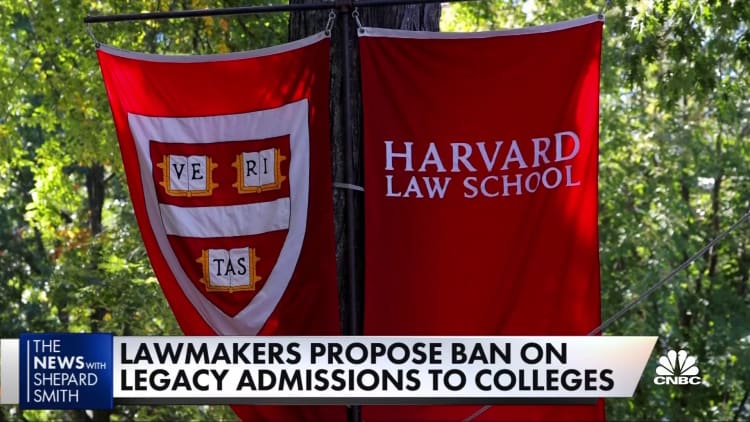

When it comes to getting into college, every little bit helps.
Often college hopefuls turn to applying early to their top school to gain that edge. By demonstrating a preference to a particular college, studies have shown, an early application can give you a leg up, which goes a long way in the hyper-competitive world of college admissions.
“The cohort of students who are applying and earning admission early has skyrocketed,” said Robert Franek, The Princeton Review’s editor-in-chief and author of “The Best 388 Colleges.”
But for many of these students, applying early may be less about where they really want to go and more about where they think they have the best chances of getting in, according to Jeff Selingo, the author of “Who Gets in and Why: A Year Inside College Admissions.”
“It’s turned it into a strategic game,” he said.
What to know about early action versus early decision
Whether it’s nonbinding early action or early decision, which is binding, the deadlines for these types of applications are typically Nov. 1 or Nov.15 for a December decision, or even earlier for rolling admission.
“A lot of people view early action or early decision as interchangeable,” said Eric Greenberg, president of Greenberg Educational Group, a New York-based consulting firm. However, “early action, in certain cases, makes no difference in admission.”
Early decision, on the other hand, can “help leverage someone’s admissions chances.”
More from Personal Finance:
These colleges promise no student debt
This is the best time to apply for college financial aid
Colleges struggle with enrollment declines, underfunding
Early applicants tend to be ‘paying customers’
For schools, offering students an option to apply early has clear advantages.
“It’s a significant win for the college or university,” Franek said.
For starters, increasing the likelihood that a student will say yes improves a college’s yield — or the percent of students who choose to enroll after being admitted — which is an important statistic for schools.
In addition, getting a head start on the makeup of the freshman class helps admissions officers balance out enrollment needs with financial aid requests.
Furthermore, “most of those students are less concerned about their financial aid package,” Franek said. “These are paying customers.”
It’s a significant win for the college or university.
Robert Franek
editor-in-chief of The Princeton Review
More schools — especially selective private colleges — now offer an early application, and those institutions accept more students ahead of the regular decision deadline, Franek said.
Of the schools on The Princeton Review’s Best Colleges list, 200 out of the 388 have an early action or early decision option in the beginning of November. (Some schools also offer another option, called Early Decision II, which is due in January.)
At those colleges, including Emory, Colgate, Swarthmore, Tulane, Middlebury and Washington University in St. Louis, as many as 50% or 60% of the freshman class comes from the early application pool, Franek said, although it could be even more than that.
At Pitzer College in Claremont, California, for example, 79% of 2020’s freshman class was admitted early.
Key factors to consider before you apply early
More often, it’s college-bound seniors with access to expert college counseling that are using early decision to better their chances of getting in.
“This is difficult to reconcile because these are students that are often getting great advice and have the financial wherewithal,” Franek said. “Other students may not know about this channel or how to navigate it.”
But despite the possibility of improving your odds of acceptance, there are other factors to consider as well, especially when it comes to financial aid.
With cost now the No. 1 factor when choosing a college for a lot of people, it’s the early bird that benefits, because some financial aid is awarded on a first-come, first-served basis, or from programs with limited funds. The earlier families apply, the better the chance to be in line for that aid, according to Rick Castellano, spokesman for Sallie Mae.

“If someone is applying early decision or early action and gets in, at that point in the calendar there’s more money available,” Greenberg said. “There’s less and less money as you go along.”
However, committing to only one institution would forgo the chance to compare different packages from other schools — although some colleges may let you off the hook if your early acceptance offer falls short of your needs. (Typically, a “better” offer includes more grant and scholarship money and fewer loans.)
Many students are not ready to make that commitment.
Eric Greenberg
president of Greenberg Educational Group
Applying early also means students have less time to work on their application, compare different types of colleges, visit campuses and prep and sit for standardized tests.
“We strongly recommend if a student is going to apply early decision that they visit the campus once or twice, even do an overnight to get the full vibe,” Greenberg said.
Still, students shouldn’t feel pressured if they haven’t zeroed in on a top choice, he added. “Many students are not ready to make that commitment.”
Some high school seniors could benefit by spending more time choosing a school, Selingo also advised.
That is true especially “if they haven’t had a chance to visit college campuses” or if money’s a concern and “comparing financial aid offers is really important.” Then it may be better to apply regular decision, he said.
“A student should wait if they need more time to think about the best fit,” Selingo said.
